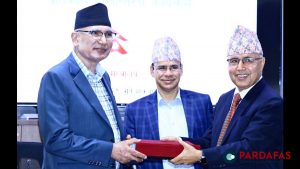
Nabil Bank Faces Chinese Obstruction: $7.44M Hydropower Project Bond Delayed
Nepal’s Nabil Bank is currently facing a formidable challenge in obtaining a counter-guarantee amount from a Chinese bank. This has resulted in a substantial delay in releasing a bank guarantee equivalent to $7.44 million (Rs 991 million) to the Trishuli Jal Vidyut Company (TJVC), further complicating an already intricate situation.
The saga began with the termination of the contract with Shuifa ANHE Group, the Chinese contractor appointed for the 37MW Upper Trishuli 3B Hydropower Project, citing under-performance in December. In response, the hydropower development company, TJVC, swiftly approached Nabil Bank, urging the immediate release of the Chinese contractor’s performance guarantee and advance payment guarantee equivalent to the aforementioned amount.
However, complications arose when the Chinese contractor sought legal intervention from a local Chinese court in Sichuan, which subsequently issued an order against releasing the counter-guarantee amount to Nabil Bank. The repercussions of this legal hurdle have left Nabil Bank in a precarious position, hesitating to release the crucial sum to the Trishuli Jal Vidyut Company.
Deputy Chief Executive Officer at Nabil Bank, Manoj Kumar Gyawali, acknowledged the claims from Trishuli Jal Vidyut Company, stating, “We are discussing the matter following the Chinese court’s order.” The ambiguity surrounding the situation has raised concerns about the potential impact on the broader financial landscape and the progress of the Upper Trishuli 3B project.
Bank guarantees, a standard practice in projects of this magnitude, are designed to ensure that contractors fulfill their contractual obligations. For foreign contractors, counter-guarantees from foreign banks add an extra layer of assurance. The current conundrum draws parallels with historical challenges faced by other Nepali banks, such as Himalayan Bank and the erstwhile Bank of Kathmandu, in securing counter-guarantee amounts from the China Construction Bank during the Melamchi Water Supply Project.
Trishuli Jal Vidyut Company CEO, Ananda Dhungel, clarified that Nabil Bank has not categorically refused to issue the amount but is inexplicably delaying the release. Dhungel emphasized, “As we have nothing to do with the Chinese bank, Nabil must release the bank guarantee amount immediately.” In a bid to resolve the impasse, the TJVC has sought the intervention of the Nepal Rastra Bank, the country’s central bank.
This incident echoes historical precedents in Nepal, where banks engaged in protracted legal battles to secure counter-guarantee amounts. Notably, the Melamchi Water Supply Project witnessed a similar scenario, with the Patan Appellate Court finally ruling in favor of the Nepali banks in 2014 after a decade-long legal battle in Chinese courts.
As Nabil Bank grapples with this predicament, the TJVC has intensified efforts to address the matter, seeking intervention from the central bank about three weeks ago. The hydropower development company expressed its frustration, revealing that the release of the $7.44 million guarantee was requested on December 1, 50 days ago, and remains unfulfilled, despite the bank’s supposed obligation to do so within seven days.
The intricate nature of international financial transactions and cross-border legal disputes in the context of infrastructure development projects is underscored by this ongoing standoff. As the Nepal Rastra Bank considers its role in resolving the situation, the broader implications of such challenges on the country’s economic landscape come into sharper focus. The unfolding events will undoubtedly be closely monitored as stakeholders navigate the complexities of this financial quagmire.
- High-Level Commission Calls for Sweeping Legal and Institutional Reforms to Revive Nepal’s Economy
- High-Level Commission Recommends Investment-Friendly Reforms and Lowering Production Costs
- Fugitive Durga Prasai Arrested in Jhapa, Being Transferred to Kathmandu
- President Paudel Extends Greetings on Mahavir Jayanti













Comments